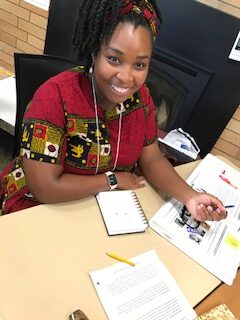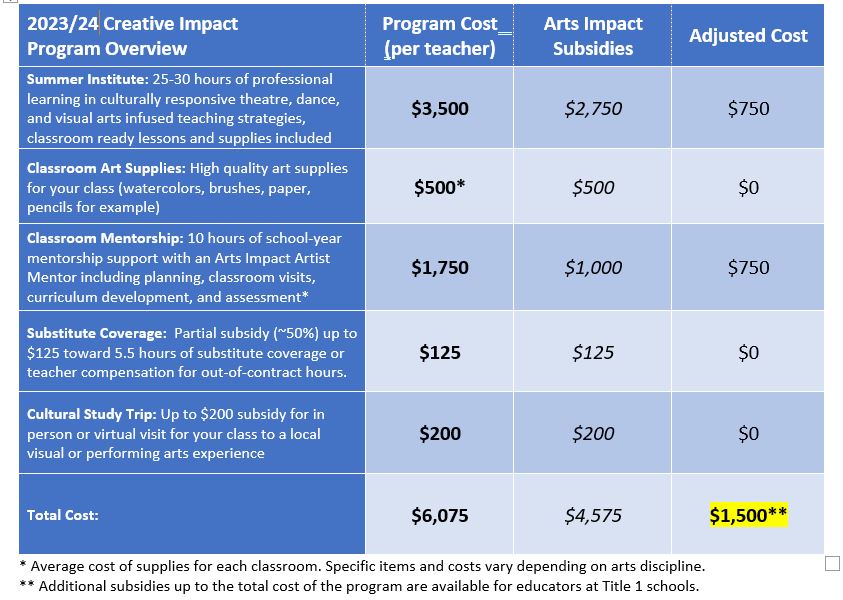
The Creative Impact Summer Institute & Classroom Mentorship offers hands-on, classroom-ready lessons with professional artists in dance, theatre, and visual arts. Art supplies are provided for all participants and their classrooms, clock hours are available, and Arts Impact offers partial and full financial subsidies. Artist Mentors partner with teachers throughout the school year for one-on-one mentorships. Arts infused curricula bring culturally grounded arts experiences together with core academic concepts that support social emotional learning and close achievement gaps.
Priority will be granted to Title 1 schools and schools with a team of at least three educators participating in the program to maximize impact. School year mentorships may be offered in person or virtually for those in the Puget Sound area, and virtually for those in the rest of the state, subject to public health guidelines and school district policies. If you have questions, please contact Grace Washington at gracew@artsimpact.org.
- Hands-on arts integrated learning in theatre, dance, and visual arts
- Culturally responsive antiracist teaching strategies
- Classroom ready standards-based arts infused lessons
- Aligned with Since Time Immemorial Tribal Sovereignty Curriculum
- Integrated with Social Studies, SEL, ELA and Mathematics
- Authentic assessment in the arts and other core subject areas
- Trauma-informed approaches through arts infusion
- High quality art supplies
- Up to 25 hours of professional learning (Institute and Mentorship Hours)
- Up to 25 Clock hours available (Institute and Mentorship Hours)
- Partial and full subsidies available (see fee structure below)
“The 2nd graders thrived on this lesson. They were able to authentically use a math tool (ruler) and geometric knowledge to create a composition, and not just a composition, but a creative city of their own imagination… “
– Sarah Lane, 2nd grade teacher
Coming soon: Creative Impact Summer Institute 2024:
4-Day Professional Learning Experience
Reaching All Students, Giving Teachers New Pathways
When Arts Impact began in 1999, the program was founded on key features of successful professional development and education practices: a concept-based approach to teaching and learning, use of performance-based assessments as a shared practice between teacher and student, and employing authentic arts integration. These key features, among others, remain integral to the achievements of the teachers who complete Arts Impact.
Arts Impact defines arts-infused teaching and learning as a model of arts integration focused on conceptual integration—concepts that are identified and taught in more than one classroom discipline—sharing a common definition of the concept. The premise of arts-infused learning focuses on the opportunity for students to understand the meaning of a concept at a deep, life application level. Arts-infused learning provides more than one viewpoint, multiple examples, and complementary ways of understanding. Arts-infused examples include: symmetry (science, dance, math, visual arts); characterization (writing, theater, visual arts, reading); and narrative sequence (reading, writing, visual arts, dance, theater).
Given the limited amount of time for classroom study based on the wealth of curricula areas in standards-based education, Arts Impact chooses to focus on arts-infused conceptual integration, over contextual integration (based on thematic approaches: rain forest, migration, etc.). The project understands contextual integration provides learning applications for a given situation of time and place.


For more information, or to bring this program to your school or district, contact Grace Washington at GraceW@arts-impact.org.
Arts Impact defines terms as follows:
- Arts-infused learning: Enables students to identify and apply authentic connections between two or more disciplines and/or to understand essential concepts that transcend individual disciplines.1
- Concept-based learning: A mental construct that frames a set of examples sharing common attributes: concepts are timeless, universal, abstract and broad.2
- Performance-based assessments: Asks students to show what they can do given an authentic task which is then judged using a specific set of criteria. Performance-based assessment provides teachers with information about how a student understands and applies knowledge. Tasks that have more than one acceptable solution lend themselves well to performance-based assessments, since they may call for the student to use higher-order thinking skills such as experimenting, analyzing or reason. According to Wiggins (1993)3 , performance assessments are developed to “test” the ability of students to demonstrate their knowledge and skills (what they know and can do) in a variety of “realistic” situations and contexts. They are deliberately designed to teach, not just measure.4
Creative Impact: Progject Based Learning (PBL) in Science, Technology, Engineering, Arts & Math (STEAM)
Partners: Tacoma Public Schools, Seattle Public Schools, Highline Public Schools, Prosser School District
Participating Schools
- Arlington Elementary ,Tacoma, WA (4 Classrooms)
- Blix Elementary School, Tacoma, WA (4 Classrooms)
- Franklin Elementary School, Tacoma, WA (2 Classrooms)
- Reed Elementary School, Tacoma, WA (1 Classroom)
- Multicultural Child and Family Hope Center, Tacoma, WA (6 preschool Classrooms)
- Stafford Elementary School, Tacoma, WA (1 Classroom)
- Tacoma Online Elementary School, Tacoma, WA (2 Classrooms)
- Travis Elementary School, Tacoma, WA (1 Classroom)
- Whitman Elementary School, Tacoma, WA (4 Classrooms)
- Concord International Elementary, Seattle, WA (1 Classroom)
- Highland Park Elementary School, Seattle, WA (3 Classrooms)
- Kimball Elementary School, Seattle, WA (2 Classrooms)
- South Park Elementary School, Seattle, WA (1 Classroom)
- Thurgood Marshall Elementary School, Seattle, WA (1 Classroom)
- Gregory Heights Elementary School, Burien, WA (2 Classrooms)
- Prosser Heights Elementary School, Prosser, WA (2 Classrooms)
Reports
2022/23 Creative Impact Report
Resources
- Consortium of National Arts Education Associations: ATTE, MENC, NAEA, NDEO. “Authentic Connections: Interdisciplinary Work in the Arts.” 2002.
- H. Lynn Erickson. Stirring the Head, Heart, and Soul: Redefining Curriculum and Instruction (California: Corwin Press, 2001), 228.
- Grant P. Wiggins. Assessing Student Performance: Exploring the Purpose and Limits of Testing (California, Jossey-Bass, Inc.)
- Grant Wiggins and Jay McTighe. Understanding by Design (Virginia: Association for Supervision and Curriculum Development, 1998).
